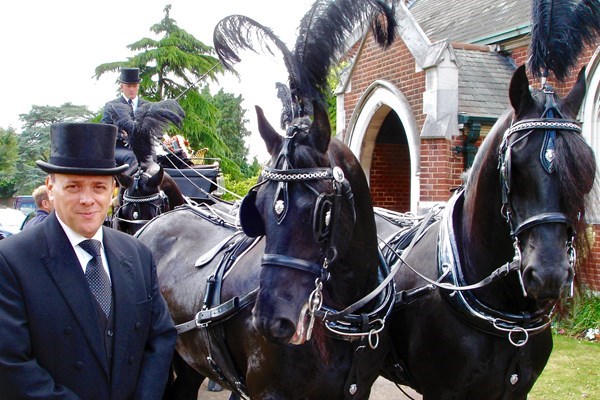A day in the life of a funeral director
As with most jobs, no two days are the same for a funeral director. While some people may be aware that a loved one may be passing soon, for others it can be an unexpected shock, and families’ reactions can vary dependent on their individual situations. Funeral directors and their teams are required to be responsive to the needs of their clients both day and night.
Emma Sparre Slater, funeral director at Francis Chappell & Sons, explains: “Being a funeral director is a full-time job - and by full-time, I mean 24/7. Even if I am officially off-duty, out shopping, or even having a drink at the pub or a meal in a restaurant, the people around me are my community - I might have conducted a funeral for them last week, or last year, or they might call on me in the future - it is important to be aware of that at all times.”
“We also take turns being on-call, so could get called on at any time of day. For example, if someone dies at home, then we’d attend their home to collect them and to meet the family and let them know the next steps. We would do that whether it was 3pm or 3am.”
What makes a good funeral director is their fluidity, ability to react and their empathy – so although the job may sound demanding, all of the funeral directors at Dignity are equipped with the skills to ensure you and your loved ones are cared for in the right way. While there is no average day per se, Rachael Barber at Gordon Barber talks us through the kind of tasks a funeral director may undertake on a day to day basis.
What Do Funeral Directors Do First?
Rachael explains: “The initial port of call in the day in the life of a funeral director would be checking for any outstanding enquiries from the night prior. There might be messages from families we’re currently working alongside who need us to give them a call back to discuss details. Alternatively, we could be picking messages up from hospitals or care homes that are notifying us of people who need to be brought into our care. Dignity has both on-call and off-duty staff, so those who have been off-duty are required to check to see whether there is anyone who has been brought into our care overnight. If there has been, there will be paperwork to prepare, and families to contact to discuss further arrangements and next steps.”
Initial contact with families
Arguably one of the most important parts of the job for any funeral director is regular contact with the family. Rachael goes on to say: “From our very first contact with the family, we are there to reassure them, to ease their burden at a difficult time and to give them the confidence and support they need to make decisions about the funeral. The first meeting with the families may take place very shortly after their loved one has passed away, when we go to collect them and bring them into our care. Within the initial meeting, we explain the basic process and next steps, however we recognise that shock and grief generally mean people struggle to retain information, so we set up a separate meeting to arrange the funeral to ensure they’re fully aware of the options available."
Making funeral arrangements
A great deal of care goes into planning a funeral, with a lot of work behind the scenes to ensure that everything happens where, when and how it should. This process usually begins at the first arrangement meeting, when we’ll talk to the family about their loved one to gain some background knowledge to learn more about them, their likes, interests and personality. These conversations assist us in understanding any final wishes they may have had, and to make sure that the funeral is tailored to the family’s needs.
Rachael describes how: “Getting to know and understand the family and their loved one is really important. By taking the time to understand their personalities, we can make recommendations about what they might have liked.”
Funeral director Philip Smyth agrees: “I worked with a family once whose young daughter had died. They wanted a horse-drawn carriage and, while chatting, it turned out she had a love of unicorns. Instead of a standard white horse-drawn carriage, I arranged to have the carriage dressed in pink and the horses dressed as unicorns. Little touches like that can make a huge difference to the day and can only happen if we really get to know the people we are supporting.”
Becoming a funeral director requires the ability to understand people deeply, as well as the ability to be efficient with the workload, such as administration and paperwork. By having this personal relationship with families, our funeral directors can assist with paperwork and ensure that the families are aware of what is required and have the necessary support.

Philip Smyth, manager and funeral director, JH Kenyon
What Does A Funeral Director Do? Planning, Planning and More Planning!
Funeral arrangers and the directors who work alongside them are responsible for making sure that everything required for the funeral is meticulously arranged to avoid any mistakes. They can assist with anything from flowers, the venue, cars to the order of service. To do this to the highest standard, we spend a lot of time talking to suppliers, sourcing unusual requests, making sure all of the legal boxes are ticked and confirming that everything the family requires will be in the right place at the right time.
Helen Griffiths, funeral director and area manager based at Hazel and Sons, explains: “I arranged a funeral once for a gentleman who had been a lorry driver. His family wanted his body to be carried on the back of his lorry down a stretch of motorway that he had frequently driven down. It seems a simple enough request, but there is a great deal that goes on behind the scenes - including things like speaking to the Highways Agency and making physical adjustments to the vehicle - to make this happen for them.”
Duncan Mason, funeral director and area manager based at T J Davies & Sons adds: “There’s a lot that has to happen that people wouldn’t even think of. As well as the day-to-day planning and making sure everything happens as it should, simple things like knowing what time schools finish or when there will be road closures are little things that can make a huge difference to the day.”
Taking someone into our care
As you would expect, a funeral arranger or director must also manage the process of taking the person who has died into our care. This might involve arranging to pick someone up from their home, or from a hospital or care home. We have a ‘care of the deceased’ process, which ensures that every single person we deal with is treated in the same way, with the same care, attention and respect.
We collect them and bring them into our care, all the time ensuring that the person, their personal effects and their dignity are cared for to the highest possible standard. The next steps involve working closely with the family, our team of embalmers, funeral arrangers and funeral operatives to ensure that the person is cared for in line with the family’s wishes.
Find out more about how we take someone into our care.
Attending a funeral
“I think this is the bit that everyone knows us for,” says Duncan, who has been a funeral director for almost 40 years, “As well as all the hard work behind the scenes caring for the deceased and their family and deciding for the funeral itself, funeral directors also attend the funerals. On the day, the role includes making sure that everyone is in the right place at the right time and the order of service is followed to ensure a smooth day.”
Emma, a training manager in South London, adds: “Lots of people are familiar with the theatre of funerals - by that I mean the traditional image of a funeral director walking in front of the cars, bearing a coffin or wearing a top hat and tails. But, on the day, there’s also a lot of logistics to oversee. As well as being completely unflappable, calm and in control, we also have to be prepared to offer crowd management and have an awareness of the actions and feelings of others at a very emotionally charged time.”
What Do Funeral Directors Do After The Service?
Steve Thomson, funeral director at Gordon & Watson in Aberdeen sums up the end of a busy day perfectly: “After the service, we return to the funeral home, and I assist the drivers in cleaning the vehicles. Once everything is tidied away, I will go and put on the kettle for a cup of tea (priorities) and report back to the arranger on how I feel things went. This will help them to prepare their call to the client to ensure they feel that we carried out their wishes to the very best of our ability.”
Working with the community
As well as the day-to-day role of caring for bereaved families and their loved ones, funeral directors also offer a service to the wider community. Many Dignity funeral directors will work with local care homes to provide staff with training and knowledge to reassure them about what happens to the people they care for. They can also arrange mock funerals to train the clergy or work with other public bodies to offer support and advice about caring for the deceased or recently bereaved.
Want to hear about what our clients say? Read more about the service we provide, or get further help with our guide to choosing the right funeral director, should you need any further assistance.

